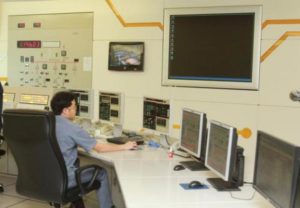
An Egat employee works in the control room of the North Bangkok Power Plant in Bang Kruai district, Nonthaburi province
Shining a light on Thailand’s electricity woes
Opening up the power market may hold the key to more efficient, less costly delivery to consumers, writes Yuthana Praiwan
The plan to open up Thailand’s power generation market comes months after the government raised eyebrows at under-performance and rampant price hikes by the Electricity Generating Authority of Thailand (Egat).
The average monthly power rate in Thailand is expected to climb 50% in the next 10 years, from 3.66 to 5.50 baht.
The increase may have convinced policymakers of the need to let private investors compete with Egat and other state utilities in order to make the market more efficient.
If prices keep rising, Thailand may lose its competitive edge in infrastructure to other players in the region — and there would be little time to mitigate the effects of such a loss, says Energy Minister Siri Jirapongphun.
Last week, policymakers made a commitment to end Egat’s two-decade quota regime, saying that opening up the market would result in a more competitive and efficient process.
The first step to deregulate power generation will be opening up the market for renewable energy. Fossil power generation will be the next step, after the findings of last month’s National Energy Reform Committee report are duly considered.
“The way to cut energy bills is not through subsidies, but by increasing the industry’s efficiency and innovation,” Mr Siri says.
No one asks who will monopolise the sector any more, he says, because the Energy Regulatory Commission (ERC) was set up in 2007 to check and balance the players in the sector.
“We struck a balance between monopoly and free market, and let the ERC work out the rules of the game to let them compete fairly,” the energy minister says.
Some might argue that Egat is inherently disadvantaged when compared with the private sector, but over the last two decades Egat has spun off several power plants into subsidiaries and listed on the Stock Exchange of Thailand, Mr Siri notes.
Among Egat’s former constituents are the Electricity Generating Plc (Egco) and Ratchaburi Electricity Generating Holding Plc, Thailand’s largest and second-largest private power generators.
The country’s high voltage transmission line (HVTL) remains national infrastructure under Egat.
Details of the deregulation programme will be set in the new national Power Development Plan (PDP), which upon its March 31 release will replace the 2014 PDP.
The first case study of a deregulated energy sector was launched in September of last year, when the ERC opened up an auction for renewable power licences for small power producers under firm-power purchase agreements (SPP Hybrid firm), says Praipol Koomsup, a Thammasat University economist and former vice-minister of energy.
During that process, 300 megawatts was auctioned and the ERC received applications from more than 85 firms with a combined capacity of 2,464MW.
Most shortlisted firms offered prices below 2.50 baht per kilowatt-hour, much lower than the average rate of 3.66 baht. This case study study suggests that competition will entice the most efficient producers to enter the market.
“It’s a pleasure to see that policymakers finally converged on the right way to cut power cost,” Mr Praipol says. Scaling back Egat’s HVTL business model is another opportunity for the ERC to trim costs, he says.
Kawin Thangsupanich, a member of the National Energy Reform Committee, says that while liberalisation is part of the panel’s energy plan, Egat will remain the nation’s power generation backbone.
Generating systems can be opened in some but not all segments, he says.
In Mr Kawin’s view, the structure of the natural gas market needs a revamp. That sector has been open since 2016, but it remains unattractive to private players because it heavily favours the sole seller, PTT Plc, by guaranteeing it a lower price. Only Egat bid to become an importer of liquefied natural gas.
Power consumers in Thailand now pay monthly bills for their electricity, but in future they could generate their own electricity through solar rooftops and sell the surplus power to other users. The coming years will see the rise of “prosumers”, Mr Kawin says.
Prosumers will enter the Thai market as soon as the Metropolitan Electricity Authority (MEA, the state-controlled transmission line utility) and the Provincial Electricity Authority (PEA) give permission to do so.
“If you don’t revamp MEA and PEA, people will begin to perceive them as they see TOT and CAT Telecom, which are far behind the big telecommunication operators in the Thai market,” Mr Kawin says.
Prosumers may generate power for their local communities and even sell the surplus outside of that community.
But Chaiwat Kovavisarach, vice-chairman of the board at BCPG Plc, one of Thailand’s top renewable energy operators, says Thailand can no longer avoid the emerging of prosumers or distributed generation.
Large power plants or fossil power developments may be scarce, he says, but renewable energy and particularly solar panels still carry high price tags.
“You cannot avoid [renewable energy],” Mr Chaiwat says. “It’s like the mobile phone that everyone must have in hand.”
Within this generation, fossil-load-based power plants may be replaced by no-fuel-cost renewable power, he says.
Putting Egat and private players on a fair playing field will require changing a lot of acts and regulations to ensure fair play, taking up a fair bit of policymakers’ time.
According to the 2015 PDP, 10 large power plants have signed purchase agreements or are committed to developing a combined capacity of 16,144MW by 2025.
Egat has committed to developing five, which would place additional capacity of 800MW in Krabi, 2,000MW in Songkhla’s Thepha, 2,600MW in southern Bangkok, 1,300MW in Bangpakong and 2,600MW in Wang Noi.
Power purchase agreements include a commitment to building 5,000MW by Gulf Power Group under the independent power producer (IPP) scheme, as well as three hydropower plants in Laos with a capacity of 1,220MW at Xayaburi, 354MW at Xe Pian and 270MW at Nam Ngiep 1.
An Energy Ministry source who declined to be named says it will be at least 15 years from now until an auction for new fossil power opens to IPPs.
Demand for energy in Thailand rises by 1,000MW every year. The planned construction of 10 power plants (five by Egat, two from Gulf Power and three from public-private investment in Laos) is expected to be completed and operations to begin over the next 15 years.
Rosana Tositrakul, a former senator and the leader of Thai Energy Reform Watch, says the liberalisation drive is part of a hidden agenda of privatising a national treasure.
There are other ways to improve the business of Egat that don’t involve decontrolling the sector, she says, like introducing performance measures along the lines of those found in the private sector.
“Egat’s return on investment capital now stands at 5%,” Mrs Rosana says. “I think this indicator is inappropriate given its cost-plus business model.”
Egat can be successful without the pressure of free competition, but it was controlled by political interests in the past, she says.
Egat’s special capacity quota should be kept at 50%, Mrs Rosana says, in line with the constitution, which sets ownership of basic infrastructure at 50% also.
By the middle of the year, the ERC will start an auction under the small power producer programme, which will involve semi-firm power purchase agreements totalling 269MW.
Egat hopes to develop a combined capacity of 2,000MW in renewable energy. But the plan has yet to be approved by the Energy Ministry and could still be scrapped.
All renewable energy auctions scheduled for last year were delayed or shelved.
As other business sectors introduce measures to prepare for Thailand 4.0, the power market is following suit and will put in place a number of initiatives to brace for digital transformation.
Source: https://www.bangkokpost.com/business/news/1397834/shining-a-light-on-thailands-electricity-woes


